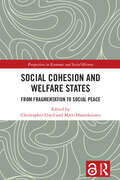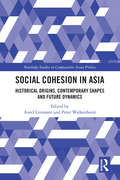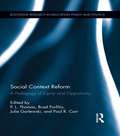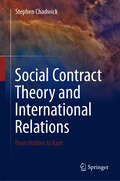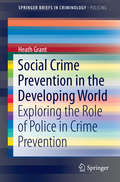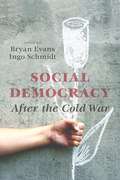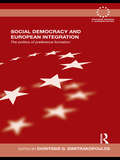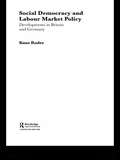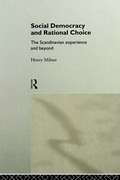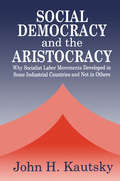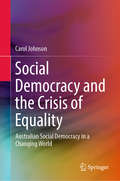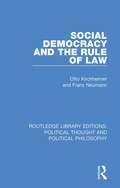- Table View
- List View
Social Cohesion And Alienation: Minorities In The United States And Japan
by George De VosAn attempt at a final summary of much of my work in anthropology has been divided into two separate volumes, Status Inequality: The Self in Culture, 1990, published by Sage Publications and this present volume, Social Cohesion and Alienation: Minorities in the United States and Japan. Many of the themes touched upon in both volumes have appeared in a series of writings that stretch through a period starting in the early sixties through the late eighties. Some of these efforts resulted in books; others appeared separately as invited contributions to symposia, as special issues of journals, or as parts of edited volumes.
Social Cohesion and Welfare States: From Fragmentation to Social Peace (Perspectives in Economic and Social History)
by Christopher Lloyd Matti HannikainenAiming to go beyond reiterating the stereotypical narrative of the rise of welfare states, this interdisciplinary book examines the long-run historical processes of the development of the welfare state. It focuses on the complex political, social, economic and institutional transformations which give rise to these peaceful and cohesive societies. Welfare is crucial to the story of peaceful social integration and this book explores and explains this vital connection, taking a non-linear view of the history of moving from fragmentation to peace with comprehensive welfare institutions. Chapters collectively focus on three central areas: (a) types of socio-political fragmentation, (b) the interconnection of social, political, and economic forces that led to the institutionalisation of integrationist processes and policies (including re-distributional welfare systems), and (c) how this new institutional development helped achieve, or failed to achieve, social peace and welfare. The international panel of expert contributors provide case studies from a rich variety of country contexts, including Germany, South Africa, the Netherlands, Austria, and the Nordic Countries. This thought-provoking collection of essays is well suited for advanced students and researchers in social history, economic history, political economy and social policy.
Social Cohesion in Asia: Historical Origins, Contemporary Shapes and Future Dynamics (Routledge Studies on Comparative Asian Politics)
by Peter Walkenhorst Aurel CroissantThis book explores the historical origins, contemporary dynamics and future challenges of social cohesion in South, Southeast and East Asia—one of the most dynamic and at the same time heterogeneous regions in the world, in terms of economic, political and human development. The comparative case studies in this volume develop a better understanding of social cohesion in Asia by exploring how social cohesion is understood, analyzed and sometimes politically instrumentalised. Examining different dimensions and qualities of social cohesion and how they are linked together, it also discusses the challenges of social cohesion in individual societies. The case studies include examples from Bangladesh, India, Sri Lanka, Indonesia, Myanmar, Singapore, South Korea and Mainland China and building on the conceptual work and empirical findings of the Asian Social Cohesion Radar, this book provides detailed cross-country analyses over the past 15 years. Combining rigorous conceptual and theoretical reasoning with a systematic empirical analysis of trends across the region, Social Cohesion in Asia will be of great interest to students and scholars of Asian politics, international relations, political sociology, comparative politics and Democratization Studies.
Social Conflicts And Third Parties: Strategies Of Conflict Resolution
by Jacob BercovitchThe pressing need to find new ways to settle social disputes and render them less destructive has led to a concern with the role that outsiders–or third parties–can play in the conflict resolution process. This book contributes to an increased understanding of the nature and activities of third parties in a wide range of conflict situations. Dr. Bercovitch first describes and interprets the major elements of the third-party intervention process, then provides an empirical examination of its structure and characteristics in settings as diverse as family struggles, labor-management problems, and international disputes. Throughout, he illustrates the dynamics of the process from the vantage point of the third parties themselves. Finally he points out the conditions most likely to strengthen this type of conflict management and discusses the means for determining the appropriate forms of intervention at different junctures of a dispute.
Social Conservatives and Party Politics in Canada and the United States
by James FarneyThe strength of the Tea Party and Religious Right in the United States, alongside the Harper Conservatives' stance on same-sex marriage and religious freedom in Canada, has many asking whether social conservatism has come to define the right wing of North American politics.In this timely and penetrating book, James Farney provides the first full-length comparison of social conservatism in Canada and the United States from the sexual revolution to the present day. Based on archival research and extensive interviews, it traces the historic relationship between social conservatives and other right-wing groups. Farney illuminates why the American Republican Party was quicker to accept social conservatives as legitimate and valuable allies than the Conservative Party of Canada.This book will be indispensable for understanding why a movement so powerful amongst American conservatives has been distinctively less important in Canada and how the character of Canadian conservatism means it will likely remain so.
Social Constructions of Water Quality in South Africa: A case study of the Blesbokspruit River in the Context of Acid Mine Drainage Treatment
by Suvania NaidooThis book details how the water quality of the Blesbokspruit River in Gauteng, South Africa was socially constructed by stakeholders and key individuals in the context of acid mine drainage (AMD) and its treatment. Social constructionism is used as the framing for this research to explain how water is intrinsically social. Findings presented here show that stakeholders are aware that the changes in the physicality of the Blesbokspruit resulted from human interventions and varied uses of the water over the years. Such knowledge, among factors such as the historical context of mining, current coal mining, flows and volumes of water, technology used and processes followed, information and communication, and vested interests influence social constructions of the water quality. What counts as the truth about water varies depending on the individual’s perspective, their purpose, and their individual interests. Further, how one defines water quality influences what treatment processes are preferred in order to improve water quality. The book explains why, for example, a treatment process meant to improve water quality gained a bad reputation by the public because of the South African government’s silo approach. The book explains how these social constructions are entrenched in power relations between stakeholders regarding AMD treatment and illustrates how power was used to influence decisions to improve the water quality of the Blesbokspruit. The case presented in this book offers insights and recommendations for policymakers working in water governance, including means to influence social constructions of water quality and ways to clarify roles and responsibilities in pursuit of improved cooperative government.
Social Context Reform: A Pedagogy of Equity and Opportunity (Routledge Research in Education Policy and Politics #5)
by Julie Gorlewski P. L. Thomas Brad Porfilio Paul R. CarrCurrently, both the status quo of public education and the "No Excuses" Reform policies are identical. The reform offers a popular and compelling narrative based on the meritocracy and rugged individualism myths that are supposed to define American idealism. This volume will refute this ideology by proposing Social Context Reform, a term coined by Paul Thomas which argues for educational change within a larger plan to reform social inequity—such as access to health care, food, higher employment, better wages and job security. Since the accountability era in the early 1980s, policy, public discourse, media coverage, and scholarly works have focused primarily on reforming schools themselves. Here, the evidence that school-only reform does not work is combined with a bold argument to expand the discourse and policy surrounding education reform to include how social, school, and classroom reform must work in unison to achieve goals of democracy, equity, and opportunity both in and through public education. This volume will include a wide variety of essays from leading critical scholars addressing the complex elements of social context reform, all of which address the need to re-conceptualize accountability and to seek equity and opportunity in social and education reform.
Social Contexts of Radicalization and Violent Extremism in the MENA and Balkans: A Multi-Country Analysis
by Corinne Torrekens Tasnim Chirchi Lurdes Vidal BertranThis volume is a multilevel and multidisciplinary study of radicalization in the Balkans and MENA regions. It takes a dynamic approach embracing the complexity of the social, political and economic contexts under study. Moving away from unidimensional and security-centred research on the topic, each chapter adopts a participatory and inclusive perspective, engaging communities, youth and women as significant stakeholders in building a better understanding of the dynamics of the radicalization of youth in these regions. The multiple case studies presented here cover several macro drivers of radicalization to reveal the interactions and interrelations of individuals with meso-institutions and backgrounds such as family, neighbourhood, school, peer groups, religious and ethnic communities, political parties, etc. Consequently, the volume addresses several gaps in the literature regarding radicalization and violent extremism: it is based on firm empirical evidence; it allows for comparisons between social contexts in one specific country and between countries sharing macro similarities but also differences; it proposes a fruitful dialogue and collaborations between academics, researchers and civil society experts; and, finally, it offers decentralized perspectives on extremism in the West. This volume is an important addition to a topic that is of interest to researchers across the social sciences, and to think tanks and policy makers working on/in these regions.
Social Contract Theory and International Relations: From Hobbes to Kant
by Stephen ChadwickThis book provides a systematic analysis of Hobbes, Locke, Rousseau and Kant with respect to international relations. These philosophers belong to the social contract tradition and are considered some of the most influential political theorists. Their ideas have played a role in the formation of national political constitutions and remain very influential both in understanding and legitimising the structure of societies around the world. This book is an innovative analysis of what these thinkers have claimed regarding the relationship between nation states, rather than contributing to the established scholarship on what they have said about individual political societies. Specifically, individual chapters examine war and peace, world governance, inequality, and terrorism.
Social Contract Theory in American Jurisprudence: Too Much Liberty and Too Much Authority (Routledge Research in American Politics and Governance)
by Thomas R. PopeDespite decades of attempts and the best intentions of its members, the United States Supreme Court has failed to develop a coherent jurisprudence regarding the state’s proper relationship to the individual. Without some objective standard upon which to ground jurisprudence, decisions have moved along a spectrum between freedom and authority and back again, affecting issues as diverse as individual contractual liberties and the right to privacy. Social Contract Theory in American Jurisprudence seeks to reintroduce the lessons of modern political philosophy to offer a solution for this variable application of legal principle and to lay the groundwork for a jurisprudence consistent in both theory and practice. Thomas R. Pope’s argument examines two exemplary court cases, Lochner v. New York and West Coast Hotel v. Parrish, and demonstrates how the results of these cases failed to achieve the necessary balance of liberty and the public good because they considered the matter in terms of a dichotomy. Pope explores our constitution’s roots in social contract theory, looking particularly to the ideas of Thomas Hobbes for a jurisprudence that is consistent with the language and tradition of the Constitution, and that is also more effectually viable than existing alternatives. Pope concludes with an examination of recent cases before the Court, grounding his observations firmly within the developments of ongoing negotiation of jurisprudence. Addressing the current debate between individual liberty and government responsibility within the context of contemporary jurisprudence, Pope considers the implications of a Hobbesian founding for modern policy. This book will be particularly relevant to scholars of Constitutional Law, the American Founding, and Modern Political Theory.
Social Contract and Political Obligation: A Critique and Reappraisal (Routledge Library Editions: Political Thought and Political Philosophy #38)
by Peter J. McCormickFirst published in 1987. This study is concerned with the problem of political obligation, the normative question of why one should obey the law, and with social contract thought as an answer to this question. It is entitled a critique, but the critique is not of social contract theory as such, but rather of the "orthodox" treatment of contract that yields so readily to the rough handling and easy rejection that is the normal lot of contractarianism in contemporary treatments. In its place will be suggested a reinterpretation of contract that sees it as making different assumptions and requiring different premises, and that is proof against many of the orthodox refutations of social contract theory; the reinterpretation is thus in the nature of a vindication. First, from an examination of the most commonly cited champions of contractarianism (namely Hobbes, Locke and Rousseau) will be derive a reinterpretation of contract in the form of a new model or syllogism, the features of which will be brought out by contrasting it first with the contemporary ideas of John Rawls and then with the orthodox model itself. Democratic consent theory, as the heir to the remnants of the orthodox model, will be examined, and the ideas of T. H. Green will be considered as embodying an important feature of contractarianism omitted or ignored by the orthodox model (and hence by democratic theory.) Finally, the new model of contract will be suggested as a potentially useful approach to the problem of political obligation in the modern context. This title will be of interest to student of politics and philosophy.
Social Control and Deviance: A South Asian Community in Scotland
by Ali WardakThis title was first published in 2000: This book provides an empirical account of social control and deviance in a South Asian community in Scotland. Focusing on Edinburgh’s Pakistani community, the book examines the social order of this particular community and the ways it is maintained. It explores the various social institutions and processes that operate as mechanisms of (informal) social control within the community. This book also examines the ways the second generation South Asians relate to their community and the extent to which they conform, or deviate from its norms. Criminological social control theory is used as an analytical framework for explaining deviance. It is concluded that the South Asian youngsters (boys) who have weak / broken bonds with their community are more likely to deviate from its norms. The book further concludes that social control and deviance are intricately interrelated. While social control defines what is deviance, the latter has important implications for the former: repeated occurrence of deviance prompts agencies of social control to redefine and gradually normalize deviance.
Social Costs and Public Action in Modern Capitalism: Essays Inspired by Karl William Kapp's Theory of Social Costs (Routledge Frontiers of Political Economy)
by Wolfram Elsner Pietro Frigato Paolo RamazzottiThe Social Costs approach to the globalised capitalist market economy has gained new relevance in recent years. The present situation is one of widespread and increasing deterioration of the social, cultural, democratic, and environmental frameworks of advanced capitalist market societies. This deterioration is indicated by the threats of unemployment, precarious working conditions and increasing income/status inequality, uneven geographical developments, and the exploitation and undermining of the institutional fabric of the society. It is aggravated by the rapid extension - at local, national, regional and global scales - of ecological disruption. So the global capitalist market economy is characterised by a great deal of instability and so-called true uncertainty, which largely undermine its coordinating and welfare-enhancing capacity. The view suggested by Karl William Kapp’s seminal evolutionary open-systems approach is that these processes and problems are the outcome of a widening gap between private individualist economic, and societal values or, to use Karl Polanyi’s terms, of the ever increasing disembeddedness of the economy from society and of the subjugation of society to the economy. The key actor in this process is business or, more specifically, it is the increasingly dominant, globalised, deregulated and disembedded hierarchical and power system of business enterprise. Current analyses of the global capitalist market economy are overdue to be undertaken making use of the powerful analytic frame of Karl William Kapp’s open systems economics. ‘Social Costs and Public Action in Modern Capitalism’ examines this approach from a theoretical, conceptual, empirical, policy and case study level.
Social Credit: The Warring States of China’s Emerging Data Empire
by Vincent BrusseeChina’s Social Credit System has fundamentally re-shaped of surveillance worldwide, with discussions of it making it into hundreds of media headlines and all the way into European Union legislation and the United Nations. Social Credit offers one of the first comprehensive assessments of this infamous system. It is aimed at the many experts and professionals – both scholarly and more broadly – that have to deal with its fallout on a regular basis. In a concise format, it covers the questions that have garnered the most attention worldwide: from social credit scoring and blacklists to its history and theoretical foundation. Throughout, its core thesis is that more often than not, even China’s government is at a loss what to do with this messy and complex initiative. This has caused fragmented and low-tech implementation, but where insufficient legal safeguards can have far-reaching implications for the normal market order and for human rights.
Social Crime Prevention in the Developing World
by Heath GrantThis Brief explores the role of social crime prevention as a crime reduction strategy in the developing world. "Social crime prevention" focuses on the social and economic factors that may contribute to violence and criminal behavior in a community. Particularly in the developing world, an understanding of the socioeconomic and political context holds long-term potential for crime reduction (rather than crime displacement); however, the strategies are complex and the results may be slow. Generally, police and law enforcement are relied upon to present quick results, where social crime prevention strategies can be viewed as being "soft on crime" or too slow. This Brief discusses the tension between the traditional role of police and proactive social crime prevention strategies in an international context, through a variety of case studies. It also provides recommendations for balancing or reshaping this role. This work will be of interest to researchers and policy makers interested in crime prevention, particularly in the developing world, criminal theory, police studies and related disciplines such as demography, sociology and political science.
Social Criticism: The Unsolved Riddle of Social Justice and Other Essays (The Royal Society of Canada Special Publications)
by Stephen Leacock Alan BowkerStephen Leacock, long celebrated as Canada's foremost humorist and social satirist, has received little recognition for his considerable accomplishments as a serious thinker and social critic. In fact, Leacock was a professor of political economy, and more than half of his writings addressed the pressing issues of his day. This volume represents the neglected aspect of Leacock's career, gathering together his writings on a range of subjects, including imperialism, education and culture, religion and morality, feminism, prohibition, and social justice.The collection begins with 'Greater Canada: an appeal,' which dates from 1907, when Leacock was a popular lecturer advancing the cause of imperialism. Bowker points out that, for Leacock, imperialism was more a spiritual mission than a political agenda, representing the opportunity to unite Canadians, to inspire allegiance to a lofty tradition, and thereby to combat the threat of materialism, urbanism, fragmentation, and continentalism. These themes resurface in subsequent essays, culminating in The Unsolved Riddle of Social Justice, which was published in 1920. Carefully selected, and prefaced with an updated introduction to Leacock's life and work, these essays contribute to our understanding of Leacock and illuminate his role as a major figure in Canadian intellectual history.
Social Cues: How the Liberal Community Legitimizes Humanitarian War (Elements in International Relations)
by Jonathan Art ChuThis Element advances a theory of social cues to explain how international institutions legitimize foreign policy. It reframes legitimization as a type of identity politics. Institutions confer legitimacy by sending social cues that exert pressures to conform and alleviate social–relational concerns regarding norm abidance, group participation, and status and image. Applied to the domain of humanitarian wars, the argument implies that liberal democracies vis-à-vis NATO can influence citizens and policymakers within their community, the primary participants of these military operations. Case studies, news media, a survey of policymakers, and survey experiments conducted in multiple countries validate the social cue theory while refuting alternative arguments relating to legality, material burden sharing, Western regionalism, and rational information transmission. The Element provides an understanding of institutional legitimacy that challenges existing perspectives and contributes to debates about multilateralism, humanitarian intervention, and identity. This title is also available as Open Access on Cambridge Core.
Social Democracy After the Cold War
by Bryan Evans Ingo SchmidtDespite the market triumphalism that greeted the end of the Cold War, the collapse of the Soviet empire seemed initially to herald new possibilities for social democracy. In the 1990s, with a new era of peace and economic prosperity apparently imminent, people discontented with the realities of global capitalism swept social democrats into power in many Western countries. The resurgence was, however, brief. Neither the recurring economic crises of the 2000s nor the ongoing War on Terror was conducive to social democracy, which soon gave way to a prolonged decline in countries where social democrats had once held power. Arguing that neither globalization nor demographic change was key to the failure of social democracy, the contributors to this volume analyze the rise and decline of Third Way social democracy and seek to lay the groundwork for the reformulation of progressive class politics. Offering a comparative look at social democratic experience since the Cold War, the volume examines countries where social democracy has long been an influential political force—Sweden, Germany, Britain, and Australia—while also considering the history of Canada’s NDP and the emergence of New Left parties in Germany and the province of Québec. The case studies point to a social democracy that has confirmed its rupture with the postwar order and its role as the primary political representative of working-class interests. Once marked by redistributive and egalitarian policy perspectives, social democracy has, the book argues, assumed a new role—that of a modernizing force advancing the neoliberal cause.
Social Democracy and European Integration: The politics of preference formation (Routledge Advances in European Politics)
by Dionyssis G. DimitrakopoulosWhat kind of Europe do social democratic parties prefer? What is the origin of their preferences? Are they shaped by interests, institutions or ideas? If so, how? Why do social democratic political parties respond differently to the crucial question of the future of the European Union? While many social democratic parties initially opposed European integration either in principle or because of the form it took, gradually they came to lend their full, though often critical, support to it. Despite this evolution, important differences between them have remained. This book examines the preferences of social democratic parties in Germany, France, the UK, Sweden and Greece towards European integration, in comparative perspective. Using a variety of sources, including interviews with key party officials, the contributors explore what kind of Europe these parties want, and seek to explain the formation and evolution of these preferences over time. They examine the interplay of national peculiarities and cross-national factors and their impact on preferences on European integration. In addition to highlighting the role of party leaders, they reveal that, far from being united on European integration, these parties disagree with each other in part because they have retreated – to varying degrees – from key social democratic principles. Making an important contribution to the scholarship on preference formation and the research that links the European Union with the nation state, it will be of interest to students and scholars of the EU, comparative politics and political parties.
Social Democracy and Labour Market Policy: Developments in Britain and Germany (Routledge Research In Comparative Politics Ser. #No.4)
by Knut RoderThis highly topical study reflects on the current problems faced by social democratic parties in government when espousing policies of severe pragmatism and fiscal prudence, and provides an historical medium-term perspective to both parties' substantial changes in labour market policies. There is now a good deal of interest in the Third Way and the Neue Mitte, and this book provides much needed empirical detail, and solid analysis of the substance of these ideas. It will be of great interest to students and researchers in comparative politics, social democracy and economic policy.
Social Democracy and Rational Choice: The Scandinavian Experience And Beyond
by Henry MilnerIs it possible in this post-socialist world, for equity and efficiency to be reconciled ? Or is a productive welfare state a contradication in terms ? This book addresses these questions in theory and in practice, using the Nordic countries as its case study.Social Democracy and Rational Choice will appeal to readers interested in comparative institutional and policy analysis, and in particular to those concerned with the future of the welfare state and the latest developments in the Nordic countries.
Social Democracy and the Aristocracy
by John H. KautskyEver since the rise of mass labor movements in the late nineteenth century, socialism has been seen as an inevi- table and antagonistic response to capitalism and the spread of industrialization. Over the course of the twentieth century, however, socialism's failure to gain ground in the United States and most of the non-Western world exposed the limited, Eurocentric views of socialist theorists, and also the inadequacy of the theory as it applied to Europe as well. John Kautsky argues that a key factor in the development of social democratic labor movements was the persistence of powerful remnants of aristocratic institutions and ideologies whose survival into the industrial age preserved exclusionary hierarchies. These led, in turn, to radicalism and class consciousness among workers.Kautsky traces the evolution of socialist labor movements in Europe and Japan where aristocratic elements were still strong, detailing the survival of aristocratic privilege and the concomitants of worker class consciousness and demands for equality. He shows how social democratic reliance on free elections was primarily a weapon against the aristocracy rather than capitalism. Contradicting socialist theory, working-class growth came to an end, class lines became blurred, and a considerable degree of equality was achieved through the welfare state. Kautsky turns to those countries that were sufficiently industrialized to have large numbers of workers, but also had reasonably free elections, civil liberties, and less repression of trade unions. Though the United States, Canada, post-Soviet Russia, Mexico, and India have very different histories and societies, their workers have not confronted a powerful aristocracy. Great Britain, the first and for long the most advanced industrial country, was virtually the last to develop a socialist labor movement. In contrast, socialist movements in Canada and the United States, where egalitarian traditions were strong, found little support. Kautsky's concluding chapters treat the spread of corruption, the rise of new oligarchies in Russia, and the position of workers no longer honored and politically weak. In its innovative perspective on long-held theories and its currency for contemporary problems, Social Democracy and Aristocracy is an important contribution to political thought in the post-Marxist world. Its global approach makes it uniquely valuable for the comparative study of labor history and economic development.
Social Democracy and the Crisis of Equality: Australian Social Democracy in a Changing World
by Carol JohnsonThis book analyses social democratic parties’ attempts to tackle inequality in increasingly challenging times. It provides a distinctive contribution to the literature on the so-called ‘crisis’ of social democracy by exploring the role of equality policy in this crisis. While the main focus is on analysing Australian Labor governments, examples are also given from a wide range of parties internationally.The book traces how a traditional focus on class has expanded to include other forms of inequality, including issues of gender, race, ethnicity and sexuality and explores both the intersections and potential tensions that result. Meanwhile there are new challenges for equality policy arising from a changing geo-economics (the rise of Asia), the legacies of neoliberalism and the impact of technological disruption.
Social Democracy and the Rule of Law (Routledge Library Editions: Political Thought and Political Philosophy #53)
by Franz Neumann Otto KirchheimerFirst published in 1987. The legal and political writings of the German Social Democrats Kirchheimer and Neumann, from the period prior to the National Socialist seizure of power, are little known to English readers. This volume presents a selection of important essays from this period, which focus on the prospects for the constitutional realization of a social democratic order in the first German Republic - the Weimar Republic, created out of the collapse of the monarchy in 1918, and destroyed by the National Socialists in 1933. Both Kirchheimer and Neumann were active as lawyers in the later 1920s and early 1930s, the latter especially having a close connection with trade union legislation and labour law. From their viewpoint as Social Democrats and lawyers they present incisive analyses of the problems confronted by the attempt to realize the ideal of a social Rechtsstaat in a political environment increasingly dominated by forces on left and right which saw constitutional order only as a means to seize power, and not as a legitimate form of order in itself. In these circumstances, political issues translated into constitutional issues, and thus could be analysed in terms of the aims and objectives of a given constitutional order. A substantial introduction by the volume’s editor, Keith Tribe, presents the political and theoretical background to these essays, which range over questions of industrial democracy, political representation, parliamentary rule and the role of judicial review. These issues are once more on the political agenda of Western industrial democracies, and the analyses of Kirchheimer and Neumann have lost none of their force and relevance, despite the catastrophic ‘failure’ of Weimar democracy in 1933.
Social Democracy in Capitalist Society (Routledge Revivals): Working-Class Politics in Britain and Sweden
by Richard ScaseFirst published in 1977. This book considers the nature of industrial society, contemporary capitalism and the impact of political ideas on social structure. These ideas are discussed by reference to the impact of social democracy on the structure of capitalist society in a comparative analysis of Britain and Sweden — including an interview survey of industrial workers socio-political attitudes. The study is concluded by a general discussion of the role of social democracy in capitalist society. It is argued that the development of social democracy generates ‘strains’ which, in the long term, question the legitimacy of capitalism among industrial manual workers.

